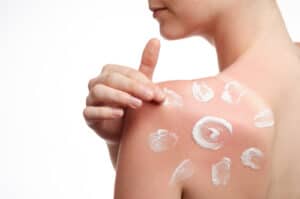The Sun and Its Rays

The sun produces two major types of ultraviolet rays. UVB rays are the main cause of sunburns and affect mainly the outer surface of the skin. UVA rays penetrate deeper into the skin and affect tissue cells. Both UVB and UVA rays damage the skin, and getting a moderate to severe sunburn once every two years can triple your risk of melanoma.
While many people believe that you can’t get a sunburn on cold or cloudy days, this is a myth. UV rays can break through most cloud coverings regardless of the outside temperature, which is why you should never assume that the sun can’t harm your skin.
UV Rays and Skin Damage
UVA rays penetrate deeper into the skin’s tissue, affecting a number of tissue cells that make up the skin. Some of the less dangerous effects of UV rays include the breakdown of collagen, which leads to wrinkles. In other cases, your melanin cells are altered, resulting in new freckles and sun spots.
On the more dangerous end of the spectrum, UV rays can lead to skin cancer. UV radiation can damage the genetic material of your skin cells over time. If enough DNA damage occurs, your skin cell growth gets out of control and develops into a tumor. These tumors can become melanoma or spread into other forms of cancer.
Protecting Your Skin
Taking steps to protect your skin from sun exposure will significantly reduce your chances of developing skin cancer and can prevent early signs of aging. To avoid unsafe UV rays, you should incorporate sun-safe behaviors as a part of your daily routine.
- Wear sunscreen every day, no matter the cloud over
- Pick a sunscreen with an SPF of 30 or higher
- Pick a broad-spectrum sunscreen the protects against both UVB and UVA rays
- Wear protective, tightly woven clothing
-
Seek shade between the hours of 10:00 am and 4:00 pm when the sun’s rays are the strongest
Choosing a Proper Sunscreen
To protect your skin from the sun’s harmful UVA and UVB rays, always choose a broad-spectrum sunscreen with a sun protection factor (SPF) of 30 or higher. Those with lighter and more sensitive skin may require an SPF of 50 or 60. Choosing the sunscreen that best suits your needs can be challenging if you have sensitive skin, are prone to oily skin, or live a very active lifestyle. Dr. Austin offers a variety of sunscreen lines to meet the needs of all his clients.
- Revision® Intellishade® sunscreen is specially formulated with advanced peptide and broad-spectrum UVA and UVB protection. It is naturally tinted and moisturizes as well as protects the skin. This sunscreen also reduces the appearance of fine lines, wrinkles, and pores. It works to fight photo-damage while working seamlessly with the rest of your skin care routine.
-
SkinCeuticals® Sport UV Defense is an oxybenzone-free, broad-spectrum sunscreen with an SPF of 50 that is ideal for all skin types. It has been tested for extreme athletic conditions and is water, wiping, and rubbing resistant for up to 80 minutes. This sunscreen provides your skin with short-term hydration for an extra moisturizing boost. Its special formula includes avobenzone and Artemia salina, which helps build the skin’s natural defense and resistance to UV damage and heat-induced stress. It is alcohol and paraben free.
-
SkinCeuticals® Sheer Physical UV Defense offers broad-spectrum protection with an SPF of 50 that provides an ultra-sheer, mattifying finish. This sunscreen has an optimized preservation system to minimize added chemicals. It is paraben-free, has a transparent finish, and is a non-irritating formula that is ideal for those with very sensitive skin. Key ingredients for this sunscreen include five percent transparent zinc oxide (Z-Cote®), six percent titanium dioxide, and Artemia salina, which helps build the skin’s natural defense and resistance to UV damage and heat -induced stress.
-
Obagi® Sun Shield TINT is a broad-spectrum sunscreen that contains zinc oxide and has an SPF of 50. This tinted sunscreen is available in both cool and warm shades to match a wide variety of skin tones. Its infrared defense helps buffer the skin from heat-derived oxidative stress.
If you are looking to protect your skin from sun damage or reverse the signs of aging caused by the sun’s harmful rays, schedule your skin consultation with Dr. Austin today. Contact our office at 503-561-7000 or fill out our online contact form for additional information.
